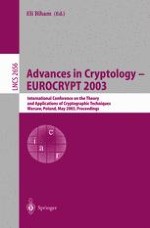2003 | OriginalPaper | Buchkapitel
Round Efficiency of Multi-party Computation with a Dishonest Majority
verfasst von : Jonathan Katz, Rafail Ostrovsky, Adam Smith
Erschienen in: Advances in Cryptology — EUROCRYPT 2003
Verlag: Springer Berlin Heidelberg
Enthalten in: Professional Book Archive
Aktivieren Sie unsere intelligente Suche, um passende Fachinhalte oder Patente zu finden.
Wählen Sie Textabschnitte aus um mit Künstlicher Intelligenz passenden Patente zu finden. powered by
Markieren Sie Textabschnitte, um KI-gestützt weitere passende Inhalte zu finden. powered by
We consider the round complexity of multi-party computation in the presence of a static adversary who controls a majority of the parties. Here, n players wish to securely compute some functionality and up to n − 1 of these players may be arbitrarily malicious. Previous protocols for this setting (when a broadcast channel is available) require O(n) rounds. We present two protocols with improved round complexity: The first assumes only the existence of trapdoor permutations and dense cryptosystems, and achieves round complexity O(log n) based on a proof scheduling technique of Chor and Rabin [[13]]; the second requires a stronger hardness assumption (along with the non-black-box techniques of Barak [[2]]) and achieves O(1) round complexity.
